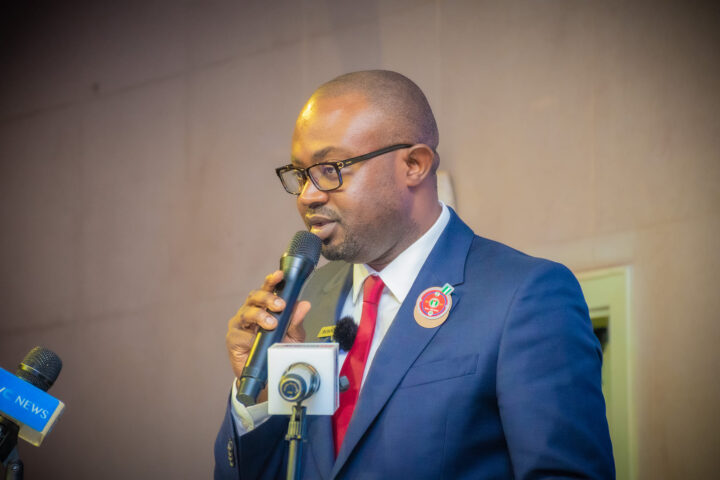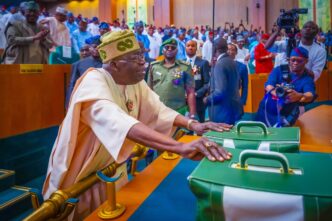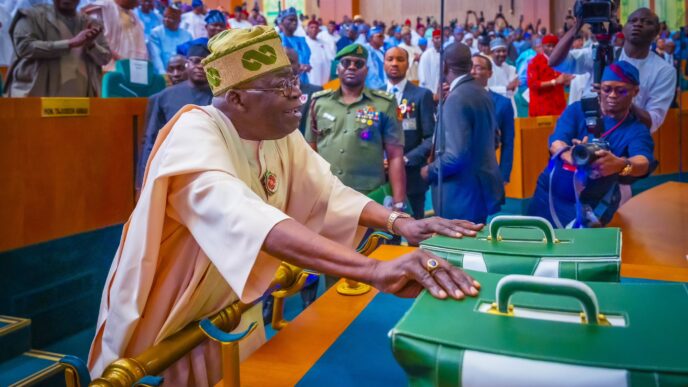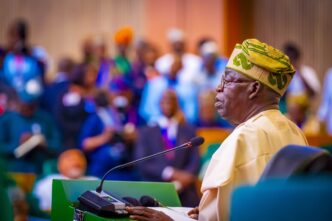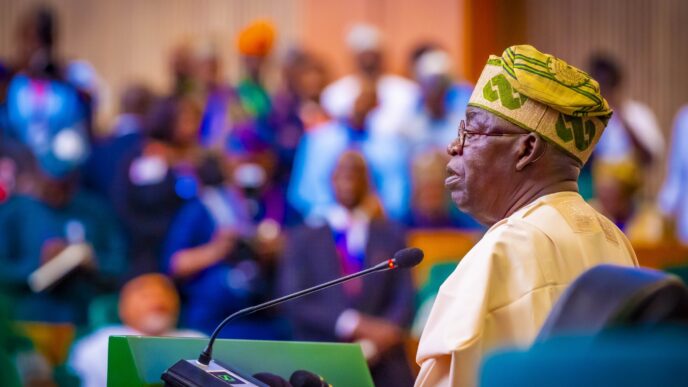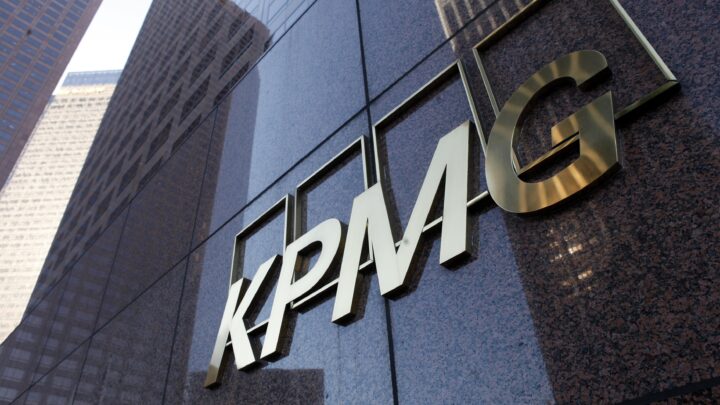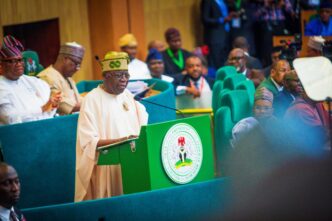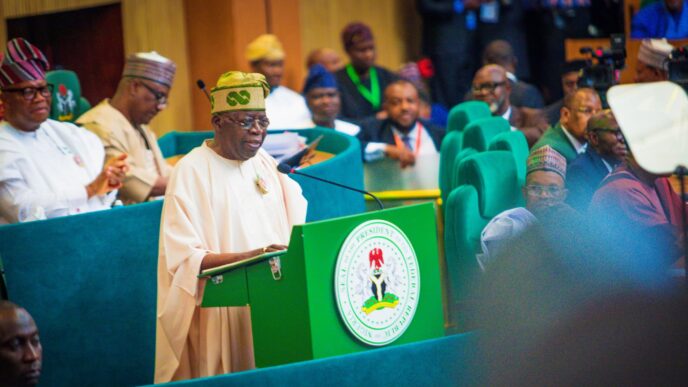President Bola Tinubu has presented the N49.7 trillion 2025 “Budget of Restoration: Securing Peace and Rebuilding Prosperity”.
Tinubu, while presenting the proposed budget for 2025 to the national assembly on Wednesday, said it is time “we rewrite Nigeria’s narrative together”.
He also said the responsibility to change Nigeria’s trajectory belongs to all — government, institutions, private enterprise, and citizens alike.
“This is not a solitary fight but a collective endeavour to restore Nigeria’s greatness,” the president said.
Advertisement
He also said the ‘ambitious’ budget is to secure the country’s future.
In the document seen by TheCable, defence, infrastructure, health, and education top the 2025 budget priorities.
Here are key highlights from the N47.9 trillion 2025 budget.
Advertisement
3.89% DEFICIT AND N34.8 TRN REVENUE TARGET in 2025
In the presented budget, the federal government aims to achieve a fiscal deficit of 3.89 percent of gross domestic product (GDP) and projected revenues of N34.82 trillion.
The president said it will reshape Nigeria’s economic landscape and lay the groundwork for a prosperous future.
In achieving the projected revenue, the federal government said it will diversify its income streams through enhanced efficiency in tax collection and an expanded tax base to boost revenues from taxes, customs duties, and independent sources.
Advertisement
The federal government benchmarked crude oil price at $75 per barrel, a production target of 2.06 million barrels per day, and an exchange rate of N1,500 per dollar (as against the N1,400/$ initially approved by the national assembly in the medium-term expenditure framework and fiscal strategy paper, MTEF/FSP).
More so, the fiscal deficit of 3.89 percent of GDP, amounting to N13 trillion, surpasses the 3 percent threshold of the Fiscal Responsibility Act, however, the government argues that it is a necessary trade-off to fund critical infrastructure and social programs.
To finance the deficit, domestic debt will be relied on to minimise foreign exchange risks, concessional external borrowing with favourable terms will also supplement funding, and engaging in public-private partnerships (PPPs).
N4.91TRN ON DEFENCE
Advertisement
Tinubu’s 2025 proposed budget pegs the defence budget at N4.91 trillion – taking centre stage as always in the annual budget and taking 10 percent share of the total budget.
The figure represents an increase of N1.06 trillion or 27.5 percent from the N3.85 trillion allocation in 2024.
Advertisement
The budget’s substantial allocation places a strong emphasis on the welfare, training, and modernisation of Nigeria’s security personnel.
Investments in security aim to prioritise; the acquisition of modern military hardware and surveillance technology; upgrading of training facilities to meet global standards; and enhancing personnel welfare to improve morale and operational efficiency.
Advertisement
According to Tinubu, the allocation reflects the administration’s clear resolve to restore federal authority in ungoverned spaces, safeguard Nigeria’s land, maritime borders, and airspace, and unlock the nation’s full economic potential.
“This budget provides the resources and direction needed to not just defend, but restore; to not just fight, but to finish. We are reclaiming every inch of our territory, safeguarding our borders, and building a secure future for all Nigerians,” he said.
Advertisement
N2.4TRN FOR HEALTHCARE ENHANCEMENT
In revitalising healthcare systems, Tinubu allocated N2.48 trillion as a provision for healthcare – 5.18 percent of the total share of the 2025 budget and higher by 50 percent compared to the 2024 N1.48 trillion budget.
The budget, according to the president, reflects a commitment to keeping Nigerians healthy, productive, and capable of driving change.
The healthcare sector received the fourth highest allocation, covering both infrastructure, basic healthcare and human capital.
“We are convinced that universal health corporate initiatives will strengthen primary healthcare systems across Nigeria. In this way, we have allocated N402 billion for infrastructure investment in the health sector of the 2025 budget and another N282.65 billion for the Basic Care Fund. Our hospitals will be revitalised with medication and better resources, ensuring quality care for all Nigerians,” Tinubu said.
EDUCATION; THIRD PRIORITISED SECTOR WITH N3.52 TRILLION
The 2025 budget allotted N3.52 trillion as education fund, to cover personal, overhead and capital expenditures – marking 7.35 percent of the annual budget.
The amount represents a 49.15 percent or N1.16 trillion increase compared to the N2.36 trillion approved in the 2024 budget.
According to Tinubu, education is the key to a prosperous tomorrow.
The president allocated N825 billion for educational infrastructure and promised a brighter future for the nation’s youth.
“This includes those for the Universal Basic Education (UBEC) and the nine new higher educational institutions,” he said.
N4.06TRN ON INFRASTRUCTURE
Tinubu said infrastructure is the backbone of any thriving economy, as a result, his government allotted N4.06 trillion to improve the sector – representing 8.48 percent of the total budget.
The president said the budget for infrastructure signals the government’s ambition to connect highways, energise industries and revitalise commerce.
“These are not just projects on paper; they are pathways to jobs, trade, and opportunities for every Nigerian to contribute and benefit from growth,” he added.
FROM 34.6% TO 15% IN 2025
The federal government projected a 15 percent as inflation rate in 2025.
According to the government, the projection will be achieved based on enhanced security measures in 2024 that will translate to easing inflationary pressures, and the commencement of domestic production of refined petroleum products will reduce the demand for foreign exchange (forex) to import the products.
Other factors that will contribute to the decline in inflation, according to the government, are increased exports of refined products to boost foreign exchange earnings and stabilise the currency, a projected increase in oil output, coupled with substantial reductions in upstream production costs, and improved macroeconomic stability and favourable policies.
Add a comment

